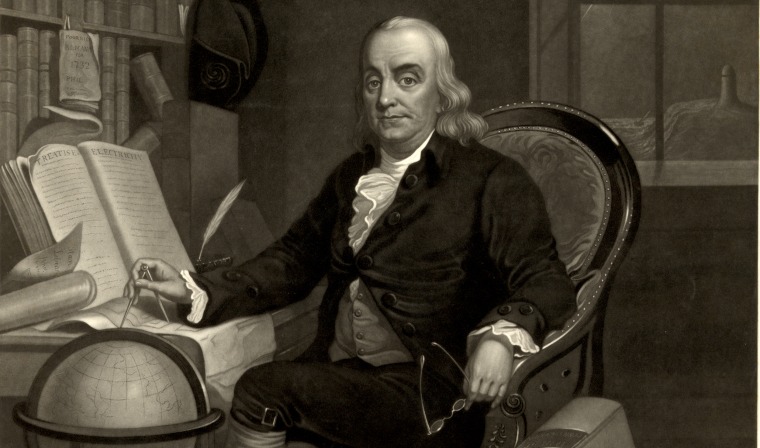People seeking medical attention in the late 18th century were subjected to a variety of fantastical practices that would raise eyebrows — and lawsuits — today. From placing a very hot cup on patients' chests to make them "sweat out" a disease (called cupping) to inducing severe skin irritation to "divert" a disease from attacking vital organs (called blistering) to bloodletting to remove illness, even our Founding Fathers, as learned and wealthy as they often were, fell victim to superstitions rather than observations about how their own bodies worked.
Historian Ron Chernow, for instance, notes in "Washington: A Life" that on the last day he was alive "[George] Washington surrendered five pints of blood altogether, or about half of his body's total supply," to the practice. Notes by Washington's doctor also indicate he was subjected to multiple blisterings by cantharides poultices, or crushed blister beetles, which causes the skin to break down on contact. His symptoms had included a sore throat, a fever and some difficulty breathing — an upper respiratory infection.
Physicians of the time, of course, had no knowledge of viruses, the connection between bacteria (discovered by Antoni van Leeuwenhoek in the 1670s) and disease, nor really any idea of how diseases spread. That is why historians believe that, for every soldier who died in combat during the Revolutionary War, 10 more died from disease. To his credit, Washington diligently quarantined his troops whenever they exhibited symptoms of smallpox, but, like almost everyone else in the 18th century, he didn't actually know how diseases were transmitted.
Benjamin Franklin, on the other hand, grasped such knowledge, even though French microbiologist Louis Pasteur wouldn't articulate his germ theory until the 1860s.
As early as 1770, Franklin had determined that something specific caused common illnesses and was being "spread by contagion," though conventional wisdom of the day held that the common cold was caused by dampness in the air or from wearing wet clothing. In 1773, he wrote to the renowned physician Dr. Benjamin Rush observing that people "often catch cold from one another when shut up together in close rooms, coaches, etc., and when sitting near and conversing so as to breathe in each other's transpiration."
Such knowledge led to an amusing encounter in 1776 between Franklin and the future second president, John Adams. On the way to a meeting in Staten Island, Franklin and Adams spent the night in New Brunswick, New Jersey. The inn was so full that Adams and Franklin had to share not only a room, but also a bed.
Franklin knew Adams was suffering from a cold, so he left the small window open in their room before retiring to bed. When Adams tried to close the window, Franklin said, "Don't shut the window, we shall be suffocated." When Adams protested, Franklin explained that Adams was "not acquainted with my theory of colds" and that if he closed the window "the air within this chamber will soon be worse than that that [air] outdoors." Adams acceded to his roommate's wishes — and historian Walter Isaacson noted in "Benjamin Franklin: An American Life" that "in addition to winning the argument over leaving open the window, it should be noted that Franklin did not catch Adams's cold."
Though coronaviruses are far more dangerous than the common cold, the principles of transmission are the same. Franklin understood such principles well enough that he'd no doubt appreciate all that Americans are doing today to flatten the curve and slow the spread of COVID-19.
Dr. Howard Markel, a medical historian at the University of Michigan, describes Franklin as "one of our earliest American scientist[s]" and said he was always "looking at the data" before drawing conclusions. If Franklin were alive now, he'd be studying the same data today's experts are analyzing and likely arriving at the same conclusions.
What's more, Franklin would probably be among those leading efforts to develop or promote a vaccine. After living through an outbreak of smallpox in Boston in which inoculation — the 18th-century equivalent to the modern-day vaccine, in which fluid from the smallpox lesions of an infected person was put into an incision on an uninfected person — was decisively shown to increase survival rates, he used his Philadelphia papers to promote the procedure.
After his 4-year-old son, Francis, died of smallpox in 1736, Franklin publicly corrected rumors that his son had died because of inoculation, encouraging other parents to consider the procedure. Franklin later wrote in his autobiography: "I long regretted bitterly and still regret that I had not given it to him by inoculation. This I mention for the sake of parents, who omit that operation on the supposition that they should never forgive themselves if a child died."
While many Founding Fathers might be scratching their heads if they could see how the nation they shaped was responding to this latest pandemic, Franklin wouldn't be. He'd understand social distancing measures and would likely be wearing a mask — of his own design, of course.
It was Benjamin Franklin, after all, who wrote: "An ounce of prevention is worth a pound of cure."



